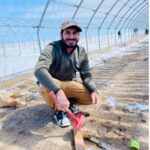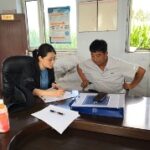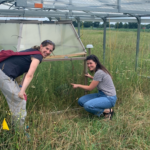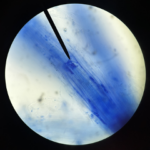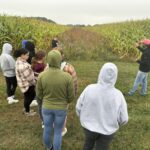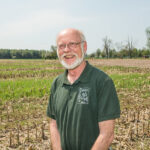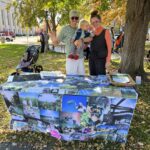BUCHANAN, MI - Buchanan Community Schools proudly announces that Melissa Frost, esteemed educator and dedicated science teacher of Buchanan High School, has been honored as the Michigan Department of Education’s Region 7 Teacher of the Year for the academic year 2024-2025. The Teacher of the Year program, organized by the Michigan Department of Education, aims to recognize and celebrate outstanding educators who demonstrate exemplary dedication to their profession and make significant contributions to the field of education. Melissa Frost exemplifies these qualities through her unwavering
Drought effect on pore structure in soils: Reflections from an LTER Fellow
Goutham Thotakuri is a graduate student in the Kravchenko lab at Michigan State University. His research is focused on the study of carbon transfer between various cover crop species and soil carbon sequestration. Recent changes to our climate dynamics have brought on alarming drought conditions in many parts of the world. Since we cannot control the climate, we need to prepare our agricultural systems for adversity. One way to do this is through understanding the soil's hydro-physical and biochemical processes. We can identify critical factors influencing drought resilience by
Exploring the effects of multiple crises on the global food trade system: Reflections from an LTER Fellow
Nan Jia is a graduate student at Michigan State University's Center for Systems Integration and Sustainability, Department of Fisheries and Wildlife, and Environmental Science and Policy Program. Her PhD research seeks to uncover how the multiple crises affect global food trade system dynamics. She worked closely with Jack (Jianguo) Liu and members of the lab to reveal the impact of different crises on different stages of trade such as production, handling, transportation, and consumption by using production data, trade data, supply chain data, and consumption data. The interactions between
Trials and tribulations of a PhD student: Reflections from an LTER Fellow
Moriah Young is a graduate student at the Kellogg Biological Station and a member of Phoebe Zarnetske's Lab. Her PhD research seeks to understand the effects of climate change on soil biota, plant, and herbivore interactions. Using a combination of field and greenhouse studies, Moriah works to understand the ways in which the composition and structure of soil microbial communities respond to warming and drought, as well as describing the role that the soil microbial community has on plant traits, stress responses, and insect preferences in the presence of warming and drought. I went into
Pools of phosphorus across the LTER: Reflections from an LTER Fellow
Ethan Weinrich is a graduate student in MSU's Department of Plant, Soil and Microbial Sciences, advised by Sieg Snapp. The Challenge Soils contain the largest pool of phosphorus on Earth. Yet, farmers need to add phosphorus to their fields to help crops grow. This is called the Phosphorus Paradox: there is so much phosphorus in soils, yet plant growth is limited by this nutrient. The tricky part is that most of the phosphorus in soils is locked away in forms not available to plants. How can plants access the phosphorus they need to grow? Phosphorus minerals in soil can be broken
Buchanan students visit KBS LTER and Kellogg Bird Sanctuary with RET Melissa Frost
Throughout 2022 and 2023, Melissa Frost, biology and chemistry teacher at Buchanan High School, joined the KBS LTER through our Research Experience for Teacher (RET) program. The NSF-funded RET program partners teachers with scientists to assist in ongoing research in the lab, as well as providing the teacher the opportunity to develop their own research project. Melissa joined Sarah Evan's lab, and worked with scientists Jennifer Jones and Caitlin Broderick. Melissa embraced the RET as a chance to integrate more research and data into her teaching. "Participating in a RET program allowed
Combine art and science in a sun print workshop at the Kellogg Bird Sanctuary
Augusta, Mich. — An upcoming workshop, hosted at the W.K. Kellogg Bird Sanctuary, will blend art and science into a beautiful sun print piece. Callie Chappell, an artist, science communicator, scientist, and a 2023 artist-in-residence with the KBS Long-term Ecological Research program, will lead the workshop, set for 11 a.m. to 1 p.m. Saturday, July 29, at the Sanctuary. Participants will be encouraged to bring culturally or personally significant materials with them for use in the project. The workshop will begin with a short walk through the
2023 KBS LTER Artist-in-Residence set for June 12-18
A Kalamazoo woodcut printmaker and teacher is the 2023 Artist-in-Residence for Michigan State University’s W.K. Kellogg Biological Station in Hickory Corners, Michigan. Launched by MSU in Summer 2022 in an effort to promote art and science collaborations, the Farmscapes to Forests: Kellogg Biological Station (KBS) Long-Term Ecological Research (LTER) Artist-in-Residence Program is now in its second year and will host Trevor Grabill from Flat Mountain Press June 12-18 as the 2023 Artist-in-Residence. According to Gretel Van Wieren, Professor of Religious
Long-time collaborator with KBS, Dean Baas, recognized as NRC-SARE Hero
Dean Baas: NCR-SARE Hero Coordinated by the NCR-SARE Alumni Organization, the term “NCR-SARE Hero” recognizes the leadership, vision, contributions, and impact that individuals have made in the field of sustainable agriculture in the region. Dean Baas’ academic training started at Michigan State University (MSU), where he received a bachelor’s degree in agricultural engineering. Baas worked for 20 years with the Kellogg Company in Battle Creek, Michigan, in technical/management positions, before returning to MSU to undertake a doctorate in environmental geosciences and biosystems
DreamScene Placemaking: Artists-in-Residence 2022
Anna Lee Roeder and Erik Vasilauskas are the husband and wife team behind DreamScene Placemaking in Kalamazoo, and our 2022 KBS LTER Artists in Residence. They visited KBS twice during their Residency in 2022. For their first visit in the spring, they stayed with us for a week and toured KBS, visited our long-term experiments, and met with scientists, students, and staff. In the fall, they presented a brownbag seminar on the development of their artistic styles and how the residency fit into that trajectory. As a product of their residency, Anna and Erik engaged the KBS summer
- 1
- 2
- 3
- …
- 5
- Next Page »

